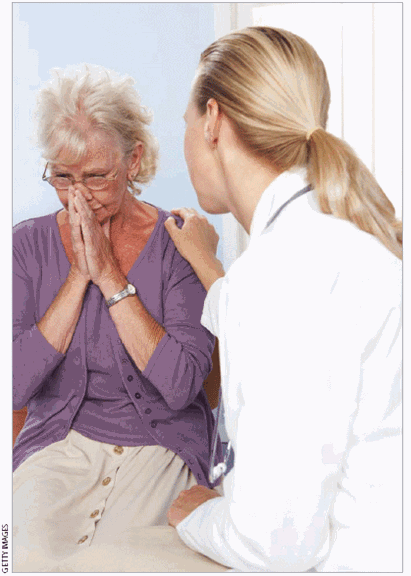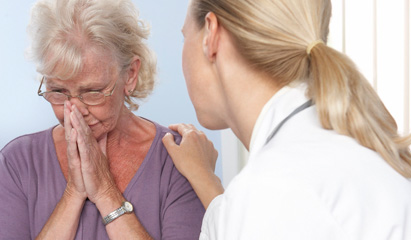PDF of Communication Skills 0510
More than a million times a year, Americans receive health news they dread: You have cancer. This moment, although traumatic, presents nurses with opportunities to provide patients with information and support that can make the journey easier.
“For most patients, when they hear that initial word cancer, their mind shuts down,” says Ruth Dein, RN, nurse navigator for oncology services at Beaumont Hospital in Royal Oak, Michigan. “They cannot hear anything beyond the diagnosis. It’s so frightening for them.”
Helping them get past that requires patience and understanding. “Being open to where they are at that time and being able to read that is key to helping someone at that stage,” suggests Leslie Irving, RN, MN, OCN, a breast oncology nurse navigator for the Seattle Cancer Care Alliance, which unites the cancer care services of the Fred Hutchinson Cancer Research Center, University of Washington Medicine, and Seattle Children’s Hospital, all in Seattle. “They just need their hand held and you being there.”
 BUILDING TRUST QUICKLY
BUILDING TRUST QUICKLY
“The patient has to trust that you are doing the best you can for them,” points out Annette Dunphy, RN, BSN, OCN, manager of cancer programs at Greenville Hospital System University Medical Center in Greenville, South Carolina. She adds, “It’s just being present and not judging patients and families based on their initial reactions with you or the physician, because when they are in that situation, they are not necessarily on their best emotional behavior.”
In general, people view nurses as trusted, competent professionals, says Teri Gilmore, RN, BSN, a breast cancer care coordinator at Adventist Medical Center in Portland, Oregon. “We’re fortunate we have that,” acknowledges Ms Gilmore. “I can expect them to be stunned. I focus first on introducing myself as a nurse.” But nurses must foster a strong relationship and get to know the person as an individual, Ms Gilmore adds.
“A good nurse builds relationships in bits and pieces,” says Barbara Henry, APRN-BC, MSN, a nurse practitioner with Psycho-Oncology Consultants and the University of Cincinnati Central Clinic in Cincinnati, Ohio and a member of the Clinical Journal of Oncology Nursing review board. “Nurses have to find ways to connect beyond talking about treatment and the medical aspects.”
Inquiring in a relaxed manner about family or occupations helps break the ice and allows the nurse to enter the patient’s world. Look for commonalities, Ms Dein suggests, and don’t be afraid to distract them with a little humor, such as a toy dog that peeks out from the desk or funny photos of a pet. “Humor is a de-stressor,” Ms Dein explains. “When patients leave my office, I like to get at least one smile out of them.”
